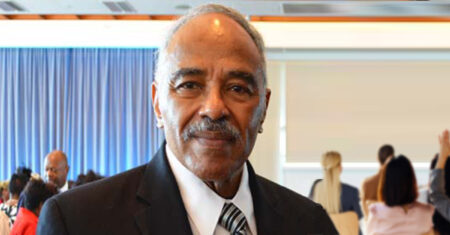By Liz Bell, EdNC
Nearly a year after Hurricane Helene left more than 4 feet of water inside the halls of Quaker Meadows Generations in Morganton, North Carolina, the child care program’s staff welcomed students and families back to its building for a new school year. The day marked a homecoming and a chance to reflect on the program’s long-running impact on the community. “Seeing those little faces walk in and how excited they were, especially the kids that were here before the hurricane, to just walk in and their little eyes see the new playgrounds and the new equipment. It was just — it closed the circle,” said Tina Kyes, family and child development director at Blue Ridge Community Action (BRAC), the child care program’s parent organization.
Parents, children, and staff posed under an arch of balloons throughout the day to celebrate the 60th birthday of BRAC, which operates three childcare programs and provides community services for families, individuals with special needs, and elderly residents across several counties in the region. The organization’s administrative offices, as well as its adult day center, were also displaced by the storm. After Helene, programs were relocated into five different locations, said Cheryl Leonhardt, director of Quaker Meadows Generations. The child care center’s classrooms, funded through Early Head Start, Head Start, NC Pre-K, child care subsidy, and private tuition, moved to a Burke County public school, Salem Elementary, and a local church. “That was our big thing — making sure that our employees were good, and that we could still give services to our families and provide them with what they needed,” Leonhardt said.
Recently, community members and Lt. Gov. Rachel Hunt gathered for the site’s grand reopening. “Thank you” signs for all the organizations and individuals who supported the program’s recovery were staked in the front lawn. “There are still people that, even though they don’t know you, they want to reach out and help you and do things for you,” Kyes said. “We’ve all been kind of amazed that we were able to get up and running so quickly.” Across the region, 148 licensed child care programs with a little more than 5,000 enrolled children were impacted by Helene, according to a presentation in August from Laura Hewitt, Child Care and Development Fund coordinator at the Division of Child Development and Early Education (DCDEE).
At the end of July, three programs were permanently closed due to storm damage, two had serious damage but were going to reopen, and four programs remained temporarily relocated. The state legislature allocated $10 million in childcare recovery funding to the North Carolina Partnership for Children, $2 million of which had been expended on Aug. 4. At Quaker Meadows Generations, staff worked overtime last week to set up each classroom in a brand new, bright, clean space. Multiple teachers described the feeling of being back in a new and improved facility as “overwhelming.”
Recovery amid larger uncertainties
Leonhardt asked Hunt to visit the program after speaking in August to Gov. Josh Stein’s N.C. Task Force on Childcare and Early Education, a bipartisan group of lawmakers, advocates, and other state leaders working on recommendations to address the statewide lack of access to high-quality, affordable early care and education. Hunt has also been on a statewide childcare tour to raise awareness about the importance of early learning for children, families, employers, and communities. Leonhardt told the task force about her program’s needs to recover from the hurricane and to continue serving the community. On Monday, she said that she is hoping to continue advocating, not just for the experiences of her own students and staff, but for the broader early childhood landscape.
One of her biggest hopes is for a sustainable public investment in the early childhood workforce. Childcare stabilization grants, first funded from the American Public Rescue Act for pandemic relief and then partially continued by the state legislature, ended in March. Like the majority of programs that received the grants, Leonhardt said her program used the funds to provide higher compensation to her staff. Because the program is part of a larger organization, she said, they can provide benefits and higher wages than stand-alone private childcare centers. That has helped the program to retain every staff member since the hurricane. They are still not able, however, to pay teachers at the level of public school teacher salaries. The grants ended while many programs in the region were in early stages of recovery, and while Leonhardt’s program was still scattered across temporary sites. Even with the program’s financial stability relative to other centers, it was hard, she said. “When that went away, that hurt,” Leonhardt said.
She said assistance for early childhood programs to retain teachers after future natural disasters is needed, and that supports like the stabilization grants should be available long-term. “There are not a lot of people that right now are going into the field, but if childcare programs were able to pay more, and people that want to be in that field saw that, then I think that would help a lot of programs be able to get more staff,” she said. The governor’s task force released interim recommendations in June aimed at expanding access and supporting the early childhood educator workforce. But the task force alone cannot allocate funding for either purpose. This session, the legislature has not allocated any new childcare funding, despite advocacy from the business community, nonprofits, and providers.
Quaker Generations Meadows offers Early Head Start, Head Start, and NC Pre-K. It also serves children through the state subsidy program and accepts private tuition from some families. Early Head Start and Head Start are federal programs aimed at serving low-income children and families with high-quality early education and family services. “We’re hoping that we help those families break that trend,” Leonhardt said of Blue Ridge Community Action’s mission to lift families out of poverty. Both through Head Start and other programming, BRAC helps families set and meet educational and financial goals, connect with other community resources, and “obtain and maintain self-sufficiency,” according to its website.
On top of hurricane recovery, operating child care programs out of temporary sites, and the end of stabilization grants, the program also experienced uncertainty due to proposed federal cuts to Head Start by the Trump administration. However, those cuts did not make it into law. “It was scary there for a while when we didn’t know if the money would come,” Leonhardt said. Though the school is back with full retention of its staff, an additional one-year-old classroom, and stable funding, recovery is not over, program leaders and teachers said. Children and families are still processing the emotional and mental toll of the storm. “That’s such a traumatic experience for them,” said Kelly Sylvester, a pre-K teacher. She said a recent trauma-informed training has reminded her of the mental health needs of children and staff. Kyes, who has been with BRAC for 40 years, said she is hoping for “no floods, no disasters, no catastrophes” this school year. “Even with things going on in childcare, I think we just want to get back to whatever normal is,” she said. “It seems like it’s been forever since we were normal.” Though establishing routines in a new and improved space will take time, Kyes said, it felt like the hard work of the program and larger community had paid off. “We’re home now,” she said.






